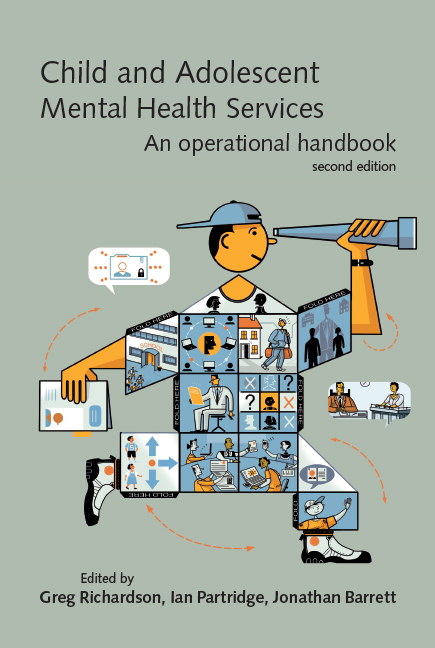Book contents
- Frontmatter
- Contents
- Tables, boxes and figures
- Contributors
- Abbreviations
- Preface
- 1 Introduction
- 2 CAMHS in context
- 3 CAMHS and the law
- 4 Structure, organisation and management of CAMHS
- 5 Evidence-based practice
- 6 Clinical governance
- 7 Education, supervision and workforce development
- 8 Multidisciplinary working
- 9 User and carer participation and advocacy
- 10 A comprehensive CAMHS
- 11 Referral management
- 12 Demand and capacity management
- 13 Strategies for working with Tier 1
- 14 Structuring and managing treatment options
- 15 CAMHS in the emergency department
- 16 Paediatric liaison
- 17 Self-harm
- 18 Learning disability services
- 19 Services for autism-spectrum disorders
- 20 Attentional problems services
- 21 Eating disorder teams
- 22 Bereavement services
- 23 CAMHS for refugees and recent immigrants
- 24 CAMHS and looked-after children
- 25 Drug and alcohol teams
- 26 Parenting risk assessment service
- 27 Court work
- 28 Tier 4 options
- 29 In-patient psychiatric care
- 30 Forensic services
- 31 Neuropsychiatry and neuropsychology services
- 32 Mental health provision for deaf children: study of a low-incidence service provision
- 33 Chief Executives – what do they want and how do they get it?
- Index
30 - Forensic services
- Frontmatter
- Contents
- Tables, boxes and figures
- Contributors
- Abbreviations
- Preface
- 1 Introduction
- 2 CAMHS in context
- 3 CAMHS and the law
- 4 Structure, organisation and management of CAMHS
- 5 Evidence-based practice
- 6 Clinical governance
- 7 Education, supervision and workforce development
- 8 Multidisciplinary working
- 9 User and carer participation and advocacy
- 10 A comprehensive CAMHS
- 11 Referral management
- 12 Demand and capacity management
- 13 Strategies for working with Tier 1
- 14 Structuring and managing treatment options
- 15 CAMHS in the emergency department
- 16 Paediatric liaison
- 17 Self-harm
- 18 Learning disability services
- 19 Services for autism-spectrum disorders
- 20 Attentional problems services
- 21 Eating disorder teams
- 22 Bereavement services
- 23 CAMHS for refugees and recent immigrants
- 24 CAMHS and looked-after children
- 25 Drug and alcohol teams
- 26 Parenting risk assessment service
- 27 Court work
- 28 Tier 4 options
- 29 In-patient psychiatric care
- 30 Forensic services
- 31 Neuropsychiatry and neuropsychology services
- 32 Mental health provision for deaf children: study of a low-incidence service provision
- 33 Chief Executives – what do they want and how do they get it?
- Index
Summary
‘Only connect.’
Edward Morgan Forster (1879–1970)Introduction
Young people at the interface of the criminal justice system and mental health services face social exclusion, alienation and stigmatisation (Bailey, 1999). The definition of this group varies across and within agencies; their needs are diverse and require a range of mental health services that can be effective only if integrated with the services of other agencies.
Young people account for almost a quarter of all persons arrested in a single year (Home Office, 2007). The psychosocial and biological factors placing young people at risk of both offending and mental health problems are well established (Junger-Tas et al, 1994; Kazdin, 1995; Rutter & Smith, 1995; Shepherd & Farrington, 1996; Rutter et al, 1998; Rutter, 1999).
Definitions
Forensic mental health has been defined as an area of specialisation that involves the assessment and treatment of those who are both mentally disordered and whose behaviour has led or could lead to offending (Mullen, 2000). Defining forensic psychiatry in terms of the assessment and treatment of the mentally disordered offender delineates an area of concern that could engulf much of mental health.
Offending behaviour is common in the whole community and among adolescents it is approaching the universal, with just under 40% of all known offenders being under the age of 21, and 24% of all offenders being aged 10–17 (Home Office, 2007). Males are more likely to have committed an offence, with 30% of males saying they had committed an offence in the past year (Home Office, 2006).
Antisocial behaviour is also prevalent with 23% of all young people having committed at least one act of antisocial behaviour in the previous year (Home Office, 2006). In practice, patients often gravitate to forensic services when the nature of their offending or the anxiety and apprehension created by their behaviour is such as to overwhelm the tolerance or confidence of professionals in the general mental health services.
In part, these cases are also driven by the emerging culture of blame, in which professionals fear being held responsible for failing to protect their fellow citizens from the violent behaviour of those who have been in their care. Mullen (2000) stresses that mental health expertise should address the mental health component of social problems, and highlights the importance of rigorous risk assessments and management.
- Type
- Chapter
- Information
- Child and Adolescent Mental Health ServicesAn Operational Handbook, pp. 284 - 292Publisher: Royal College of PsychiatristsFirst published in: 2017



